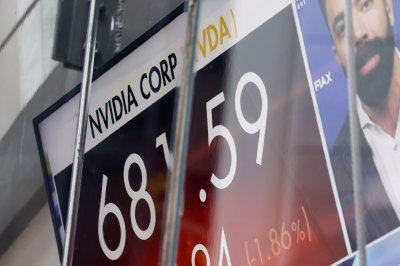Aug. 11 (UPI) — U.S. chip makers Nvidia and Advanced Micro Devices inked an “unprecedented” deal in which they will pay 15% of their sales to China to the U.S. treasury in exchange for export licenses to ship their advanced H20 and MI308 semiconductors.
The administration of U.S. President Donald Trump has begun issuing licenses to both companies to supply the AI chips to China, sources and officials told the BBC and the Financial Times on Sunday, after Nvidia CEO Jensen Huang met with Trump last week.
The arrangements came two months after Trump reversed an earlier decision banning Nvidia from exporting its H20 chip to China, with the Santa Clara, Calif., firm moving to cut the deal because the Commerce Department’s Bureau of Industry and Security had not issued the expected licenses.
Nvidia developed the H20 chip specifically for the Chinese market after the administration of President Joe Biden imposed sweeping export controls on advanced chips for AI in 2023. Before Trump’s ban, analysts estimated Nvidia would ship 1.5 million H20s this year, worth $23 billion.
AMD, which is also headquartered in Santa Clara, did not immediately comment on the development, but Nvidia said it always adhered to U.S. regulations when it came to exporting and warned of the risk of the U.S. losing its first-mover advantage.
“We follow rules the U.S. government sets for our participation in worldwide markets. While we haven’t shipped H20 to China for months, we hope export control rules will let America compete in China and worldwide.”
Saying the development was without precedent, Forrester Vice President Charlie Dai said it demonstrated very elevated market access costs in a climate of rising tensions in global trade, generating “substantial financial pressure and strategic uncertainty for tech vendors.”
The deal, which takes to a new level Trump’s tactic of using trade restrictions to pressure multinationals to invest in the United States or shift manufacturing there, has attracted criticism from security experts who called the H20, in particular, a “potent accelerator” of Chinese AI that would help its military and erode the United States’ lead in the technology.
“If you have a 15% payment, it doesn’t somehow eliminate the national security issue. You either have a national security problem or you don’t,” said Deborah Elms, trade policy head at the Hinrich Foundation, a think tank.
BIS officials have also raised concerns along with 20 security experts who wrote Commerce Secretary Howard Lutnick asking him not to authorize licenses to export the H20.
“Chips optimized for AI inference will not simply power consumer products or factory logistics; they will enable autonomous weapons systems, intelligence surveillance platforms and rapid advances in battlefield decision-making,” the letter said.
Nvidia earlier dismissed the claims regarding China’s military and that the H20 would help Chinese AI to leap forward.
But Liza Tobin, China expert and National Security Council member in the first Trump administration, warned against monetizing the transfer of dual-use technology.
“Being must be gloating to see Washington turn export licenses into revenue streams. What’s next — letting Lockheed Martin sell F-35s to China for a 15% commission,” she told the FT.
